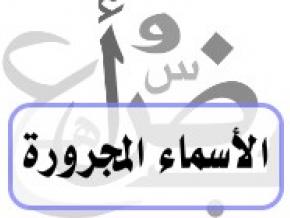Arabic Nouns: Genitives Posted by Fisal on Nov 11, 2015 in Arabic Language, Grammar, Vocabulary
- Ahlan أهــْــلاً , Arabic lovers! Today, we are going to continue our study of the Arabic grammar and add some little title to our Index of Arabic Grammar. We have gone a bit deeper so far. However, it is still a long way!
- In a previous grammar post, we discussed the Arabic Nouns Case. That post was followed by another two ; Arabic Nouns; Nominatives and Arabic Nouns; Accusatives. What is remaining is the Arabic Nouns; Genitives and this is exactly what we are going to talk about today.
- Actually, the word “genitives” in Arabic means الــمــجــرورات /Al-Majrourat/. This word is derived from the root verb جــَــرَّ /jar’ra/ (to pull or to drag). So, these nouns are dragged (inflected) by something (e.g. prepositions) and this act of dragging (inflection) is marked by the diacritic Kas’rah most of the time. Now, what are the nouns that fall into this category?
Definition:
Genitives or Al-Majrourat الــمــجــرورات are the nouns that are in the genitive case. These nouns are marked by a Kas’rah كــســرة (or an equivalent) on the ending letter(s). In Arabic, the genitive case is called (Al-Jarr) حــالــة الــجــر and nouns that are in this case are called (الــمــجــرورات) or الأســمــاء المجرورة. Adjectives that modify these nouns/words are in the same case and have the same Harakah (Tashkeel).
Genitives (Al-Majrourat):
These are the types of nouns that fall into this category:
- The Genitive (Al-Majrour) by a Preposition الــمــجــرور بــحــرف جــر: We have already learnt about the different Arabic Prepositions. So, if a noun comes after these prepositions, then it is in the genitive case and it has a a Kas’rah on its ending. We define this nouns as “genitive” or as (a Majrour) noun by a preposition because the preposition was the real cause of this case.
Ex. وصــل الــقــطــارُ إلـى الــمــحــطــةِ = The train arrived at (got to) the station.
Ex. رأيــتُ واحــداً مــن الأســودِ = I saw one of the lions.
In the above two examples, the words الــمــحــطــة (station) and الأســُــود (lions) are in the genitive case because they are preceded by the prepositions إلـى and مــن . They are both marked by a Kas’rah on the ending letter.
- The Genitive (Al-Majrour) by Idaafa الــمــجــرور بــالإضــافــة: we were introduced early to the Idaafa and Modaaf structures when we were discussing definite nouns. To make things clearer, if we have an indefinite noun that is followed by a noun or a pronoun that defines it, we call this structure Idaafa and the second noun is pronoun is called Modaaf. Modaaf literally means “added” and it is added to provide more information about the indefinite noun that precedes it and and thus changige it into a definite noun by Idaafa.
Ex. هــذه مــدرســة. = This is a school. (‘school’ here is an indefinite noun)
Ex. هــذه مــدرســتــي. = This is my school. (‘school’ here is a definite noun)
Ex. هــذه مــدرســة الأولادِ. = This is the kids‘ school. (‘school’ is also definite here)
Ex. هــبــطــتْ الــطــائــرة عــلــى أرضِ الــمــطــارِ = The plane landed on the airport ground.
In the first example above, the word school is an indefinite noun. Whereas, the second and third examples it changes to a definite noun because there is another word (الأولاد) or attachment (the pronoun Yaa of the speaker) that is added after it to make it definite. The Idaafa (literally means ‘addition’) whether it is a noun or pronoun is called Moddaf and it is always in the genitive case with a Kas’rah on its ending. So, The pronoun Yaa of the speaker in the second example above is a Modaaf Majrour by the Kas’rah and so is the noun الأولاد (kids) in the third example. In the fourth example, the word الــمــطــار (airport) is modaaf to the word أرض and so it is Majrour by Idaafa too.
- The Genitive (Al-Majrour) by being an Adjective: Arabic adjectives are different from English adjectives. The Arabic adjective must be in the same number, gender and case as the noun it modifies. Thus, if a genitive (Majrour) noun is followed by an adjective, then the adjective is in the same genitive case. So, if we add an adjective to the Majrour nouns in the above examples, then this adjective is also in the Majrour case.
Ex. رأيتُ واحــداً مــن الأســُــود الــجــائــعــةِ = I saw one of the hungry lions.
Ex. هــذه مدرســة الأولادِ الأذكــيــاءِ. = This is the smart kids’ school.
Ex. هبطت الطائرة على أرض المطار الــجــديــدِ. = The plane landed on the ground of the new airport.
*****
Find all our grammar posts here; Index of Arabic Grammar.
*****
Check us back soon
Peace سلام /Salam/

Build vocabulary, practice pronunciation, and more with Transparent Language Online. Available anytime, anywhere, on any device.
About the Author: Fisal
Well, I was born near the city of Rasheed or Rosetta, Egypt. Yes, the city where the Rosetta Stone was discovered. It is a small city on the north of Egypt where the Nile meets the Mediterranean. I am a Teacher of EFL.





Comments:
labami:
Thanks a lot for the arabic tips. I love arabic language and the information you send helps to all people who wants to learn arabic language to improve in all aspects of this beautiful language.
Best regards from México.
Fisal:
@labami You are very welcome, Labami 🙂
ghani senik:
Thanks alot. The explaination is very concise and clear. Veryh good. I like it.